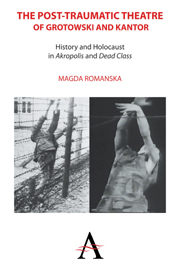 The Post-traumatic Theatre of Grotowski and Kantor
The Post-traumatic Theatre of Grotowski and Kantor from Part I - Our Auschwitz: Grotowski's Akropolis
Grotowski was very much influenced by Hasidic philosophy. He admittedly read Martin Buber's I and Thou, and Gog and Magog, and was greatly impressed by Buber's philosophy of history and religion. Buber, an Austrian-Jewish philosopher who believed in the Hasidic principle of the unification of religious practices with everyday life, was fluent in Polish, and his writings were quite popular in postwar Poland. As Karen Underhill pointed out,
Buber's early lectures on Judaism and his and his wife Paula Buber's retellings in German of Hasidic tales appealed particularly to those who had moved away from traditional religious practice, had been educated in German, Polish, or Czech, and had joined, or hoped to join, a cosmopolitan, secular European culture as citizens of their respective countries. Estranged from their ethnic and religious traditions, and often no longer speaking a Jewish language, whether Hebrew or even Yiddish, many in this generation developed a more or less-articulated longing for a revived relationship with Jewish tradition. […] He was able to appropriate the image of the Jew as Oriental, to make it a sign of how Jews had in themselves and in their tradition a source of deep spirituality that modern European intellectuals and artists were now seeking. […] Buber describes a particular type of individual (variously described as the Oriental, the Jew, the mystic) who is open and susceptible to the perception of that authenticity and wholeness.
To save this book to your Kindle, first ensure no-reply@cambridge.org is added to your Approved Personal Document E-mail List under your Personal Document Settings on the Manage Your Content and Devices page of your Amazon account. Then enter the ‘name’ part of your Kindle email address below. Find out more about saving to your Kindle.
Note you can select to save to either the @free.kindle.com or @kindle.com variations. ‘@free.kindle.com’ emails are free but can only be saved to your device when it is connected to wi-fi. ‘@kindle.com’ emails can be delivered even when you are not connected to wi-fi, but note that service fees apply.
Find out more about the Kindle Personal Document Service.
To save content items to your account, please confirm that you agree to abide by our usage policies. If this is the first time you use this feature, you will be asked to authorise Cambridge Core to connect with your account. Find out more about saving content to Dropbox.
To save content items to your account, please confirm that you agree to abide by our usage policies. If this is the first time you use this feature, you will be asked to authorise Cambridge Core to connect with your account. Find out more about saving content to Google Drive.